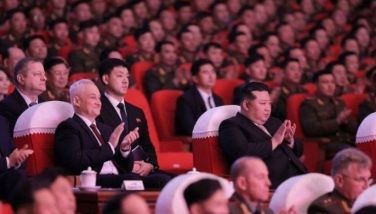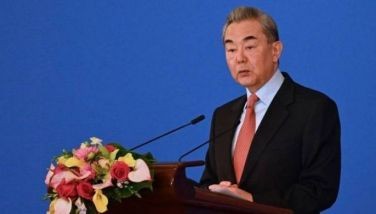Japan stimulus mulled as inflation, output weaken
TOKYO - Japanese Prime Minister Shinzo Abe is planning about 3.5 trillion yen ($29 billion) in fresh stimulus, including subsidies and job-creating programs, to help pull the world's third-largest economy out of recession.
Officials said yesterday that details of the plan would be approved by the Cabinet on Saturday as it wraps wrap up work for 2014. The plan reportedly includes 420 billion yen ($3.5 billion) in help for stagnant regional economies.
Abe took office for a third term on Wednesday and faces strong pressure to do something to restore growth after a sales tax hike in April put Japan back in recession.
Data released yesterday showed inflation eased slightly in November as household spending dropped, hindering the government's effort to get the economy out of recession and back to sustainable growth.
Core consumer prices, excluding food, rose 2.7 percent, while the inflation rate, excluding food and energy, was 2.1 percent. The inflation rate was 2.9 percent in October.
Overall incomes fell 1.1 percent in November from a year earlier, while household spending was down 2.5 percent. Unemployment was flat at 3.5 percent.
Abe's stimulus plan will focus on providing more support to lower income families and to Japan's regions where growth has stagnated, reports said yesterday.
Japan's central bank is buying up to 80 trillion yen ($660 billion) in assets each month, mostly government bonds, to help spur inflation, but so far has not attained its target of 2 percent price increases overall. Meanwhile, since wage increases have not kept pace with inflation, rising share prices and corporate profits have done little to stimulate consumer demand, apart from a rush of purchasing ahead of the April tax hike.
A large share of the proposed support for local governments will be handouts to local governments, to be used for shopping vouchers to entice people to spend more, local media reported. The government will also provide funds to back loans to small and medium size businesses that have struggled with rising costs thanks to a weakening in the yen, which has boosted the prices Japanese pay for energy, food and other imported goods.
Another key aim is to ensure improved job prospects for younger Japanese in regions that are suffering from severe population decline as jobseekers crowd into the cities.
Not all of the proposals enjoy universal support. Talk of tax breaks for companies that relocate offices out of Tokyo and into regional cities worries officials in the capital trying to boost investment in the city.
"Japan won't move forward unless Tokyo leads the country as a locomotive," the Jiji news agency cited Tokyo Gov. Yoichi Masuzoe as saying in a recent interview. "Tokyo should not be regarded as evil."
- Latest
- Trending































